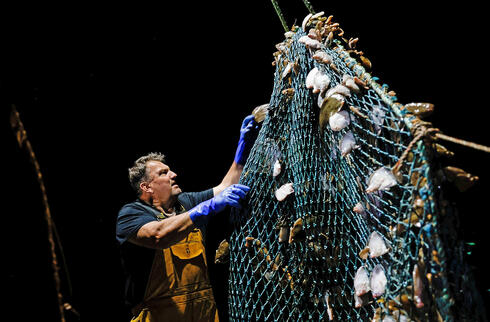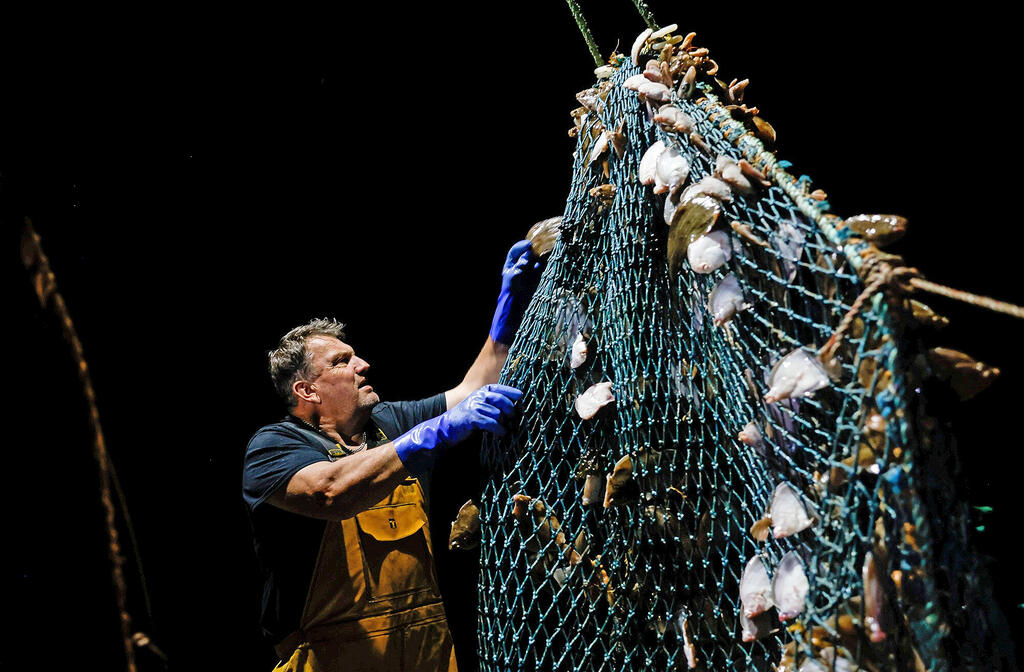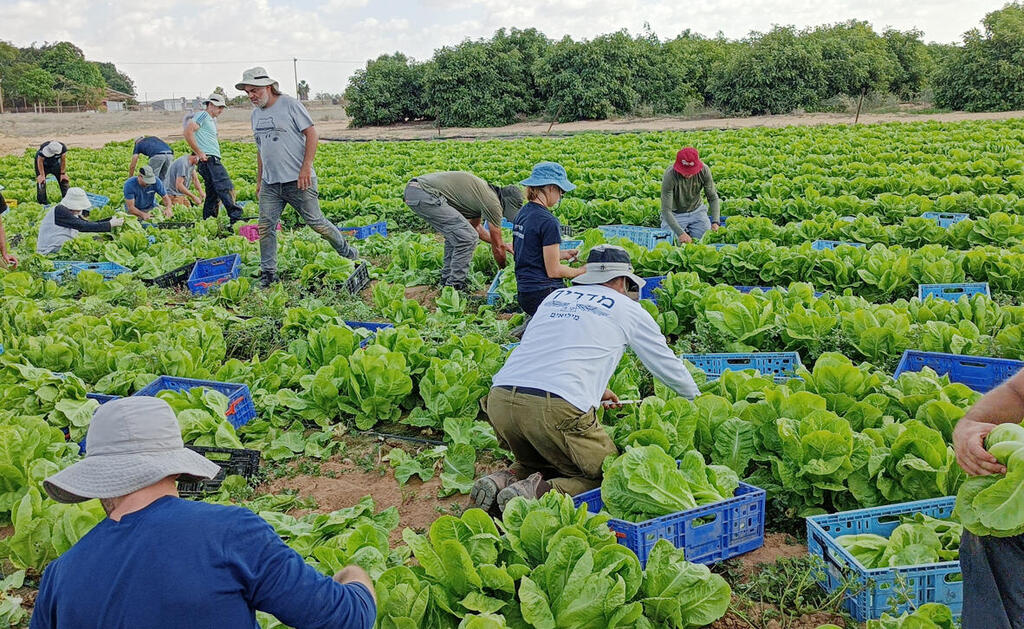
Climate change threatens global food system, countries must mobilize
Israel is among 130 countries that signed a UN declaration at the Climate Conference in Dubai to adapt their food systems to fight climate change, but is it too little too late?
Fish and avocado enthusiasts faced troubling news this week; about a quarter of the world's freshwater fish species are at risk of extinction, according to the updated IUCN (International Union for Conservation of Nature) Red List of Threatened Species. This is mainly due to climate change, along with overfishing and pollution – all caused by human activity. Among others, the Atlantic salmon is under increasing threat, with its global population having declined by 23% from 2006-2020.
In Spain, this reality has already been evident in their vast avocado orchards which present a grim picture of a worsening climate crisis. As the world's third-largest exporter of avocados (behind only Mexico and Peru), Spanish farmers are forced to uproot trees. Many farms in the south of the country, which account for about 40% of avocado production, have been abandoned or awaiting significantly lower crop yields - less than half in a typical year.
In a changing climate, farmers globally are forced to reconsider their crop choices, and consumers feel it keenly in their grocery carts and wallets. The drought in countries like Spain, Italy, and Greece has led to a 130% surge in global olive oil prices, according to a 2021 NASA study. The global sunflower seed yield is projected to decrease by 24% by the end of the century, warns a study by the University of Helsinki.
The European Central Bank and the Potsdam Institute's research indicates that climate change has already driven up food prices and inflation. If meaningful adaptive measures are not taken, global warming will cause annual increases in food prices and average inflation worldwide. These increases are expected to range from 0.92-3.23% per year, based on projected climate conditions for 2035. As climate damages escalate, the world is reconsidering cultivation areas, understanding that farmers will have to uproot their crops and plant others more suited to a warming climate or relocate their fields to cooler regions, which were previously considered too cold for many crops.
Global food system is under threat
Food systems face a dual challenge: adapting to a changing climate worldwide and reducing their enormous impact on the climate crisis while joining the fight against climate change through judicious use of land. Climate change also impacts food production. About 735 million people or 9.25% of the global population, face chronic hunger, according to the UN and over 3 billion people cannot afford a healthy diet. After years of neglecting the issue, world leaders are now discussing the transformation of global food systems amidst the escalating climate crisis. From farm to table, food systems, especially animal agriculture, are responsible for about one-third of greenhouse gas emissions. Without changes, this proportion will only grow as the world's population increases, leading to increased demand for food. Scientists already warn that without changes in the agriculture and food industries, the world will fail to meet emission reduction targets.
U.S. Special Envoy for Global Food Security Dr. Cary Fowler outlined the depth of the problem at the UN Climate Conference in Dubai this week: even if the world manages to limit global warming to one and a half degrees, agriculture and food production worldwide will still suffer severe consequences, saying, "The worst years climatically for agriculture in the past will be the best years for agriculture in the future." Over 130 countries at the conference (out of around 200 participants) responded to the challenge, voluntarily and without stringent criteria for now, agreeing to make their food systems a central part of the climate change mitigation plan.
As part of a declaration signed which emphasizes that agriculture and food production industries must urgently respond to climate changes, signatory countries need to work together to facilitate adaptation efforts and resilience for farmers. They should also take additional actions to change production methods that are healthy for the soil, prevent food waste, and loss of biodiversity. This collaboration aims to stimulate innovation and funding for climate-resilient agricultural solutions. The signatory countries, representing over 5.7 billion people and almost 500 million farmers, produce 70% of the world's food and are responsible for 76% of all global food system-related emissions (25% of the world's total emissions). To support the declaration's commitments, the signatories will present individual plans on the topic until 2025.
Israel is among the signatories, and Ambassador Gideon Behar, Israel’s Special Envoy For Climate Change and Sustainability, represented Israel at the conference highlighted the opportunity for the local industry. “Israeli methods such as drip irrigation, precision agriculture, crop improvement, preventing agricultural product loss, and using purified wastewater for irrigation contribute significantly to reducing greenhouse gas emissions and increasing yields. Israel is also the second most advanced country in the world in the development of protein substitutes. This type of food can greatly contribute to increasing global food security.”
Similar to climate agreements signed at annual conferences for the past 28 years, each country will set its own rules, and there will be no sanctions for non-compliance. To encourage action, the UN's Food and Agriculture Organization has published a roadmap for the first time outlining key actions in ten areas, including crops, fisheries, marine agriculture, food loss, land, water, and waste. The organization's goal is to challenge the prevailing narrative that increased production is synonymous with higher emissions and environmental degradation, and to highlight the opportunity within agri-food systems to improve production efficiency while aligning with climate mitigation, adaptation and resilience goals.
The organization has presented 120 proposed actions and major milestones in ten areas, including crops, fishing, aquaculture, food loss, land, water and waste. This plan aims to reduce the emissions of the agricultural food systems by 25% by 2030 relative to 2020. It also wants to turn agricultural fields into a carbon sink that absorbs 1.5 gigatons of greenhouse gasses in the soil per year by 2050 by changing agricultural practices instead of being a source of significant pollution. It also seeks to ensure sustainable management of the world's fisheries until 2030 and beyond.
Israel especially vulnerable to climate change damages
This region is considered particularly vulnerable from a climate perspective. Israel in particular is warming faster than the global average, getting drier and is subject to a dangerous series of potential climate disasters, from droughts, to fires and floods. Even if technology has managed to solve the irrigation problem for some crops thanks to desalination and wastewater recycling, the increasing number of hot days continues to threaten many crops.
A comprehensive study recently carried out by a team that included researchers from Israel and Great Britain examined the effects of climate change on agricultural crops. The research focused on field crops and orchards, irrigated with stagnant water and those that depend on rainwater. The results of the study indicate a negative effect of climate change on the crops, mainly due to the increase in maximum temperatures during the day and at night. "Extreme droughts like the ones we have experienced in recent years severely damaged the plantation crop including avocados and citrus fruits, and the lack of 'cold hours' reduced the cherry and apple crops in the north of the country," says Dr. Amir Givati, the Chief Science Officer at EnviroManager, which led the study for the Ministry of Agriculture.
"Climate change will require Israel to re-plan agriculture in the coming decades. Rain-dependent crops such as wheat in the northern Negev will have difficulty surviving in the future climate in the region. The expected high temperatures here will severely damage crops that need cold periods. Even olives - the symbol of the Mediterranean - will have to adapt to the hot climate and it is doubtful that they will be able to survive.”
Government ministries have recognized the problem and have held roundtable discussions on food security in the era of climate change in recent years, but progress has been slow. Only in September was a comprehensive report presented on the subject, and as of now, there is no detailed and consolidated plan to address the numerous challenges. A unique local challenge has been added: the need to cope with security situations such as wars that can disrupt global supply chains, affect food imports, and can inhibit the cultivation of agricultural lands, as is happening now in the Western Negev after entire communities were evacuated, and foreign workers in the agriculture sector left the country. Already, the implication is a surge in prices of fruits and vegetables, so inflation is not only driven by climate-related damages in global agriculture, but also by the cost of war in Israel.
Tamar Gannot Rosenstreich, Deputy Director of Adam, Teva, V’Din, says, "As an island nation, Israel relies on food imports and agricultural produce. As global crises intensify, alongside crises like the one we are currently experiencing in Israel, building climate resilience is not just a slogan - it is a matter of survival. In our tough neighborhood, what Israel needs to do is adopt a national strategy for food security based on maximizing the potential of local agriculture and identifying opportunities for double profit - agriculture that reduces emissions and conserves resources."















